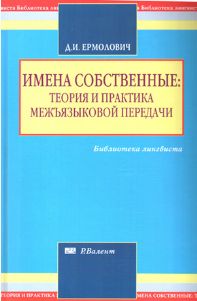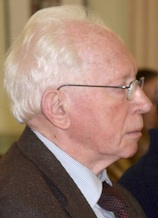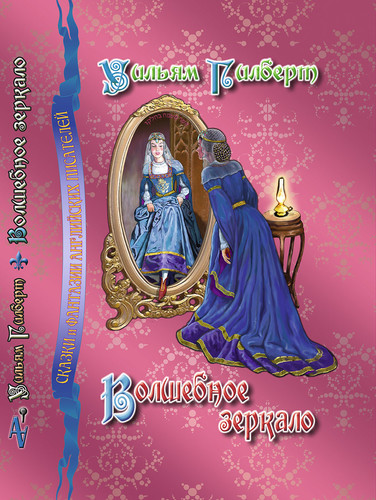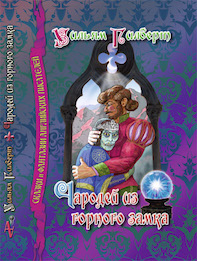
Страничка обо мне на сайте «Город переводчиков»
Эта страничка создана автором сайта, переводчицей Екатериной Рябцевой, наряду со страницами, посвящёнными другим переводчикам, в рубрике «Лицо профессии».
Страничка обо мне в русскоязычной «Википедии»

Эта страничка создана в начале 2008 г. добровольными авторами «Википедии» – как следует из рубрики «История», её включили туда Denisbaltin и Андрей Романенко. С этими джентльменами я не знаком, но признателен им, что они сочли нужным дать сведения обо мне в этой Интернет-энциклопедии, которую с полным правом можно назвать народной.
Я узнал об этой странице случайно уже в 2009 году и позволил себе внести кое-какие уточнения в библиографические данные о моих публикациях.
Страница в «Википедии» мало чем отличается от того, что опубликовано на сайте «Город переводчиков», но там есть еще раздел «Обсуждение», где я прочитал какие-то отзывы об одной из моих книг и ответил на них.
Впрочем, отзывы и мнения лучше оставлять на страничке обратной связи или в разделе «Вопросы-ответы, дискуссии».
Статья «Word for Word» в газете The Moscow Times
Корреспондент газеты The Moscow Times Анна Мальпас (Anna Malpas) написала в газете о своих впечатлениях от заседания Клуба переводчиков, на котором я выступал с рассказом о своей работе над Новым большим русско-английским словарем и другими словарями и книгами. Статья с фотографиями появилась в рубрике Context, посвященной событиям культурной жизни Москвы.

Рецензии на издание:
Д.И. Ермолович «Англо-русский и русско-английский словарь религиозной и возвышенной лексики». — М.: Р.Валент, 2004.
На этот словарь имеется несколько рецензий:
Автор рецензии - Рой Ф. Кохорн (Roy Cohrun), американский переводчик, словарный эксперт бюллетеня SlavFile отделения славянских языков Американской ассоциации переводчиков (American Translators Association). Окончил бакалавриат Мерилендского университета по специальности русский и чешский языки. Кроме перевода и лексикографической критики, занимается также исследованиями по советской и российской авиации.
Полный текст рецензии в pdf-формате.Not everything is taught in class when one studies Russian. Either that, or the student daydreams through part of the course and misses important tidbits of information.
This thought struck me when I realized certain gaps in my own knowledge as I translated my first article for a client that included Biblical references. Because of a dearth of Russian-to-English cultural or religious dictionaries at that time, I thought a reference to 4 Царств was a typographical error when I found the passage being cited in II Kings in a Revised Standard Edition translation of the Bible. Either my instructors, native Russian speakers all, had never touched on the books of the Bible, or my brain was somewhere else the hour they did.
With the publication of D.I. Yermolovich’s Англо-русский и русско-английский словарь религиозной и возвышенной лексики, translators finally have at least one source to which to turn when translating religious terms. With only about 5,000 terms (according to its own claim—more like 4,200 according to my estimate), the dictionary attempts to cover more than Christianity. There are terms from Buddhism, Hinduism, Islam, Judaism, Zoroastrianism, and more, each indicated with an appropriate abbreviation, the expansions of which are found on pages 6 and 7 of the book. Even мунисты (the Moonies, followers of Sun Myung Moon’s Unification Church) is included.
(Национальная лига переводчиков России)
Читать полный текст рецензииОтличное справочное пособие вышло в изд-ве «Р.Валент». Дмитрий Ермолович, автор большого числа публикаций в области лингвистики, двуязычной лексикографии и перевода, переводчик-синхронист, профессор кафедры перевода английского языка МГЛУ, с большим вкусом и хорошим знанием предмета подготовил англо-русский и русско-английский словарь религиозной и возвышенной лексики.
Такого рода справочники пока малочисленны по вполне понятной причине – во времена СССР даже библия находилось в спецхране библиотек и выдавалась «кому положено», а не каждому интересующемуся. Из справочной литературы в основном были доступны такие издания как «Настольная книга атеиста» (неплохая, кстати, книга) и публикации из серии «В помощь пропагандисту».
 Рецензии на монографию:
Рецензии на монографию:Ермолович Д.И. Имена собственные: теория и практика межъязыковой передачи. — М.: Р.Валент, 2005. — 416 с. — (Библиотека лингвиста).
На эту книгу имеется несколько рецензий:
- Рецензия д-ра филол. наук И.И. Убина (Всероссийский Центр переводов)
- Рецензия Н.К. Дупленского (Национальная лига переводчиков России)
Уважаемый читатель, рекомендую тебе интересную и своевременную книгу. Она пригодится самому широкому кругу людей, связанных с переводом, написанием и оформлением документов. Имена собственные окружают нас повсюду – дома, в транспорте, на работе, в магазине, в театре и кино. С ними мы сталкиваемся, читая газеты и книги, отчеты и письма на бумаге и в электронном виде. Эти сферы жизни человека можно перечислять практически до бесконечности. Сложнее найти ту область деятельности человека, где имена собственные не встречаются совсем или же не играют существенной роли.
Актуальность этой книги становится совершенно очевидной, если мы взглянем на самих себя и на ту обстановку, которая нас окружает. С течением времени у каждого из нас постепенно накапливается много самых разных документов – свидетельство о рождении, несколько документов об образовании, свидетельство о браке, у некоторых свидетельство о разводе и другие документы, в которых зафиксированы наши имена и фамилии, имена наших родителей и детей, адреса, названия различных учреждений и организаций. Мы даже не задумываемся, как много имён собственных в наших документах, пока нам не приходится их переводить.
Читать полный текст рецензии
Рецензия Н.К. Дупленского (Национальная лига переводчиков России)
Читать полный текст рецензииВ силу необъективных причин мы в свое время не разместили на нашей «Книжной полке» это замечательное пособие, написанное Дмитрием Ивановичем Ермоловичем, представлять которого переводческому сообществу нет никакой нужды.
Лексикограф, педагог и практикующий переводчик, он продолжил развивать в этой книге тему «Заимствование и передача имен собственных с точки зрения лингвистики и теории перевода», поднятую еще в 2001 году в издании «Имена собственные на стыке языков и культур». Тема эта – как горячая картошка: и в руке не удержишь, и бросить нельзя. Все дело в том, что единства во мнениях по этим вопросам в лингвистическом и переводческом сообществе нет. Применяемые принципы находятся в процессе динамических изменений – настолько динамических, что мы теперь с трудом узнаем свои фамилии в загранпаспортах нового образца, странногибридные принципы написания которых были рождены в недрах МВД! <...>
Отзывы о словаре:
Д.И. Ермолович, Т.М. Красавина. Новый Большой русско-английский словарь. / Под общим рук. Д.И. Ермоловича. — М.: Русский язык—Медиа.— XXXVI, 1098 с.
1-е изд.: 2004.
2-е изд., с испр. и доп.: 2006.
3-е изд., стереотипное: 2008.
Отзыв Д.С. Мухортова
Отзыв Ирины Лычак (Украина)
Review by Joseph L. Anderson (New York, USA)
Отзыв Д.С. Мухортова,
кандидата филологических наук, старшего преподавателя кафедры английского языкознания МГУ им. М.В.ЛомоносоваВ 2004 г. произошло событие вселингвистического масштаба. Появился «Новый большой русско-английский словарь» под редакцией Д. И. Ермоловича и Т. М. Красавиной, преемник словаря под редакцией А. И. Смирницкого. Достоинств его не перечесть, самое главное — то, что он составлен лексикографами-переводчиками. Словарь Ермоловича-Красавиной незаменим для тех, кто идет в ногу со временем, кто хочет, чтобы его перевод на английский звучал идиоматично, выверенно и адекватно.
Мухортов Д.С. Практика перевода: английский—русский: Учебное пособие по теории и практике перевода.
М.: Высш. школа, 2009. — Изд. 2, испр. и доп.
Отзыв Ирины Лычак (Украина),
сайт http://www.language-translation-help.com
For a long time, there was a lack of good Russian-English dictionaries comparable in quality with good English-Russian dictionaries available on the market. Russian-English dictionaries materially lagged behind the developments in the Russian language and actually did not meet needs of many dictionary users. In 2004, that gap was bridged with the publication of the New Comprehensive Russian-English Dictionary by D.I. Yermolovich and T.M Krasavina (hereinafter referred to as Yermolovich's dictionary). As the title of the foreword states, this Russian-English dictionary mirrors "new vocabulary of the two languages at the start of the third millennium."
The new dictionary is based on the Comprehensive Russian-English Dictionary by A.I. Smirnitsky and O.S. Akhmanova, which was the largest and one of the most popular Russian-English dictionaries for many years. The first edition of Smirnitsky's dictionary was published in 1948. Since then, the dictionary has been republished many times. The author died in 1955, so later updates were made by other lexicographers. The most thorough update was made in 1992. The later editions are stereotype, that is not revised to reflect the evolution of the Russian language.
In addition to the standard Russian vocabulary readily found in any other generalist Russian-English dictionary, Yermolovich's dictionary includes many general words and phrases that are difficult to find in other dictionaries. To cite a few examples, жирность - 'fat content', кисломолочный - 'fermented milk' (adjective), креплёный - 'fortified' (wine), негоже - 'it is inappropriate', прилюдно - 'in public', содеянное - 'one's doings'.
Yermolovich's dictionary is distinguished by thorough coverage of the household vocabulary (words and expressions related to everyday life), the baby-talk vocabulary (words and expressions used by toddlers and infants or by adults in talking to children), onomatopoeic words (words that imitate natural sounds), and interjections. In these fields, any other Russian-English dictionary is lacking. Have you ever tried to find such words as пиф-паф, вжик, ух ты, бяка, воображала, ата-та and the like in a Russian-English dictionary? They are missing. Yermolovich's dictionary fills in the gap. It explains that подставка под чайник is 'a trivet', венчик - 'an eggbeater', бананы - 'tapered leg trousers', фантик - 'a candy wrapper', попка - 'buttocks’, ‘fanny'.
The dictionary gives English equivalents for names of popular Russian fairy tales, plays, operas and ballets. In addition, one can find translations for religious and church formulas, events, and icons. Idiomatic expressions are widely presented too. Take for example idiomatic uses of the word край: пойти на край света за кем-либо - 'to follow somebody to the ends of the earth', услышать краем уха - 'to hear from a distance', краем глаза - 'out of the corner of one's eye', хватить через край - 'to go overboard'.
This new Russian-English dictionary contains a wealth of new words that have enriched the Russian language over the past two decades. This includes a great number of new colloquial expressions and slang words. For example, the slang word отстой means ‘trash’, ‘junk,’ or ‘dreck,’ though its literal meaning is ‘sediment,’ ‘residue,’ ‘dreg,’ or ‘sludge.’
It should be noted that the authors of the dictionary performed a large amount of work to identify new meanings of long-known words such as зависать - 'to hang' (of a computer), вести - 'to lead' (in a competition), каталог - 'a directory', мышь - 'a (computer) mouse', окно - 'a (program) window', and many more. The dictionary mirrors new terminology that has come into existence recently, including widely used terms from such areas of knowledge as information technology: баннер - 'a banner', дисковод - 'a disk drive', утилита - 'a utility'.
There are many more remarkable features of this Russian-English dictionary... Okay, enough description. Bottom line: The incredible amount of work the authors have put into compiling this dictionary earns praise. No doubt it is the best generalist Russian-English dictionary available on the market today. The dictionary will be a valuable asset for translators and interpreters, linguists, teachers of Russian and English, and language learners. People interested in English and Russian languages will enjoy reading this dictionary too.
Review by Joseph L. Anderson (США)
на сайте Amazon
Unsurpassed and Indispensable
This Russian-English dictionary is simply the best, beating all the competition, including the most recent 2008(?) update of the Oxford Russian, which is itself pretty good, but not as good as this. This dictionary is more exhaustive and provides better coverage of colloquialisms and slang. The only drawback with this Yermolovich dictionary (aside from being currently not available) is that it was apparently designed primarily to be sold to Russians who want to know what a Russian word means in English but don't need to be told how to pronounce the Russian word in oblique cases. For more detailed pronunciation guidance, you would have to use the Oxford or, of course, an orthograpic dictionary (both of which any advanced student of Russian probably already owns) as a supplelment. My advice: procure this dictionary and get the Oxford as well, since it too is good and (unlike this one) goes both ways (Russian-English and English-Russian.)
Отзывы об учебнике Д.И. Ермоловича «Русско-английский перевод» (М.: Аудитория, 2014)
 М.Я. Цвиллинг (1925–2013),
М.Я. Цвиллинг (1925–2013),
профессор кафедры теории, истории и критики перевода МГЛУ:
Учебник Д.И. Ермоловича – это как раз то издание, которое восполняет остро ощущаемый пробел: учебников по переводу на английский было крайне мало, и почти все они устарели. В учебнике нашёл отражение опыт преподавания данного предмета на переводческом факультете МГЛУ, одним из ведущих представителей которого является автор этого издания.
И по содержанию, и по структуре, и по качеству включённого в него теоретического и практического материала учебник полностью соответствует задачам обучения студентов переводу с русского языка на иностранный.
 Константин Иванов,
Константин Иванов,
профессор, заведующий учебной частью факультета устного и письменного перевода Женевского университета:
I have received the Handbook by Dmitry Ermolovitch and have carefully looked it through. As I thought, it is a very good and useful book for any Russian student planning to work into English B, as well as for an English student working from the Russian.
A sine qua non condition for all my Russian students whom I start teaching French-Russian interpretation at FTI (Faculté de traduction et interprétation) is to have bought and have mastered a classical French <–> Russian Translation/Interpretation handbook by a well-known Russian linguist Vladimir Gak. I have been approached by these students many times with a question: is there an equivalent for the English-Russian combination? I have always answered - not to my knowledge. Now my answer would be - yes, at least for Russian into English. So I would strongly recommend it.
Chargé d'enseignement, FTI, Geneva University
 Павел Палажченко:
Павел Палажченко:
Учебник Д.И. Ермоловича «Русско-английский перевод» - важнейшее, уникальное пособие, имеющее большую научную и практическую ценность и не имеющее аналогов в России и за рубежом.
Автор основывает подачу материала на систематическом сопоставлении лексических, грамматических и стилистических особенностей русского и английского языков и средств, используемых ими при выражении мыслей и описании ситуаций. Это позволяет переводчику освоить навыки и «алгоритмы» предпереводного анализа текста. Следующая задача – освоение принципов и приемов достижения адекватности в переводе, которые подробно описаны в пособии. Комплекс получаемых знаний и навыков позволяет переводчику обосновать свой перевод, а преподавателю – дать оценку переводу не на основе интуитивных представлений, а осмысленно и аргументировано.
Благодаря систематичности и полноте изложенного в тексте материала, а также наличию «Ключей» (вариантов перевода предлагаемых в учебнике текстов) пособие дает возможность организовать учебный процесс в условиях дефицита преподавателей высокой квалификации, имеющих значительный переводческий опыт. Оно также может использоваться как справочник для переводчиков и редакторов при работе над текстами различной тематики.


